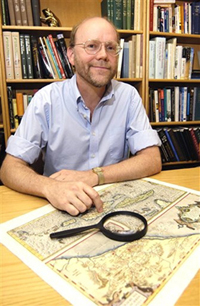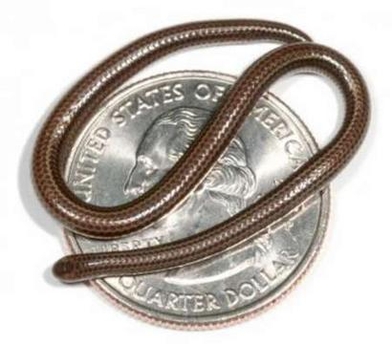A Tiny Snake: Ethnoknown and Nationalism
Posted by: Loren Coleman on August 10th, 2008

The inhabitants of Barbados are mad as hell at Blair Hedges (above) and they want the world to know it. Recently mentioned here was the announcement of the finding of the world’s tiniest snake.
However, long gone are the days of something that is ethnoknown and then calmly being “discovered” by scientists.

Associated Press writer Danica Coto gets to the bottom of the story: A small snake has sparked a big debate in Barbados. Residents of the wealthy Caribbean nation have been heating up blogs and clogging radio airwaves to vent their anger at a U.S. scientist, who earlier this week announced his “discovery” of the world’s smallest snake and named it Leptotyphlops carlae, after his wife Carla.
“If he needs to blow his own trumpet … well, fine,” said 43-year-old Barbadian Charles Atkins. “But my mother, who was a simple housewife, she showed me the snake when I was a child.”
One writer to the Barbados Free Press blog took an even tougher tone, questioning how someone could “discover” a snake long known to locals, who called it the thread snake.
“How dare this man come in here and name a snake after his wife?” said the writer who identified themselves as Margaret Knight.
The man she refers to is Penn State University evolutionary biologist S. Blair Hedges, whose research teams also have discovered the world’s tiniest lizard in the Dominican Republic and the smallest frog in Cuba.
Hedges recently became the first to describe the snake — which is so small it can curl up on a U.S. quarter — when he published his observations and genetic test results in the journal Zootaxa.” Full-grown adults typically are less than 4 inches long.
Hedges told The Associated Press on Friday that he understands Barbadians’ angry reactions, but under established scientific practice, the first person to do a full description of a species is said to have discovered it and gives it a scientific name.
He said most newly “discovered” species are already well known to locals, and the term refers to the work done in a laboratory to establish a genetic profile. In the study, he reported that two specimens he analyzed were found in 1889 and 1963.
“There are no false claims here, believe me,” Hedges said.
Damon Corrie, president of the Caribbean Herpetological Society, acknowledged that Hedges is the first to scientifically examine and describe the snake, but the so-called discovery makes locals seem ignorant.
“It gives the impression that people here … depend on people from abroad to come and show us things in our own backyard,” Corrie said.
Karl Watson, a historian and ornithologist at the University of the West Indies in Barbados, said it’s common for people to get excited over very tiny or very large animals.
“Probably people have overreacted. … It’s nationalism going a bit awry,” Watson said.
Hedges agreed: “I think they’re carrying it a bit too far.”
“Snakes are really apolitical,” he said.
About Loren Coleman
Loren Coleman is one of the world’s leading cryptozoologists, some say “the” leading living cryptozoologist. Certainly, he is acknowledged as the current living American researcher and writer who has most popularized cryptozoology in the late 20th and early 21st centuries.
Starting his fieldwork and investigations in 1960, after traveling and trekking extensively in pursuit of cryptozoological mysteries, Coleman began writing to share his experiences in 1969. An honorary member of Ivan T. Sanderson’s Society for the Investigation of the Unexplained in the 1970s, Coleman has been bestowed with similar honorary memberships of the North Idaho College Cryptozoology Club in 1983, and in subsequent years, that of the British Columbia Scientific Cryptozoology Club, CryptoSafari International, and other international organizations. He was also a Life Member and Benefactor of the International Society of Cryptozoology (now-defunct).
Loren Coleman’s daily blog, as a member of the Cryptomundo Team, served as an ongoing avenue of communication for the ever-growing body of cryptozoo news from 2005 through 2013. He returned as an infrequent contributor beginning Halloween week of 2015.
Coleman is the founder in 2003, and current director of the International Cryptozoology Museum in Portland, Maine.










A vote in favor of ‘cataloged’ instead of discovered in such situations.
I understand their anger perfectly. But it should not be directed at the US but at science itself. Blair Hedges is not an Ambassador of the US but an employee who is paid to define what is real from what is unreal. People who have seen Bigfoot and have gotten discredited will also feel anger when science finally “discovers” the great ape of North America. In fact, any person who is ahead of their time will feel the same irritation when science finally catches up.
I really hope that this snake gets some serious protection. Perhaps they can do well in captivity and breed when kept as pets in terrariums.
If these islanders cared so much and it was so well known for so long by the locals, Why did not even one of then describe it before to science ? Or they just to busy chilling and don’t believe in stepping up to the modern world of scientific discovery AND RECORDING of the local flora and fauna of these endemic island species? I guess there are not any local scientist that can follow though with the sometimes difficult process.
I am not a member of the PC police but I did find that remark about being “too busy chilling” stereotypical at best and racist at worst.
It is what is known in the newspaper business as “the silly season” when rent-a-quote types get their names in the paper by blowing up non-existant news stories.
Nothing to see here, move along.
“If these islanders cared so much and it was so well known for so long by the locals, Why did not even one of then describe it before to science ? Or they just to busy chilling and don’t believe in stepping up to the modern world of scientific discovery AND RECORDING of the local flora and fauna of these endemic island species? I guess there are not any local scientist that can follow though with the sometimes difficult process. ”
Or, ya know, maybe it was so common they just assumed it had been recorded before. Barbados isn’t exactly huge. There probably aren’t tons of biologists local to the area.
Silly
O.K. Mr. “Evolutionary Biologist”, if “snakes are apolitical”, then why don’t you back away from the ego table you’re (over) feeding at, and re-name it “The Thread Snake” out of respect to the people who’ve known all about it forever? NO, you name it after your wife! I’m sure she worked really hard to help you “discover” it.
typical…And yes someone of Mr. Hedges’ ilk will undoubtably try to put his name on the Sasquatch if and when one goes under the knife at some (tax payer payed for) snobby “Evolutionary Biology” University lab. When American indians have been telling us about them forever. As I’ve stated before; The only White Man that should even get a sniff at having his name put on the “scientific” name of the Sasquatch is Roger Patterson.
This is really interesting. Considering that many newly catalogued animals are in fact ethnoknown long before they are brought to the attention of science, this is a curious look at the friction that can come about when naming a new animal. Unfortunately, the person who describes it to science is typically the one who gets credit, so Blair Hedges is perfectly within his rights to name it as he pleases. I do think he could have perhaps been more mindful when doing so of the feelings of the local people, but traditionally he can name it whatever he pleases. It does not matter whether it was known by the locals or not. This is the way it typically has always been whether you like it or not.
As to the “why didn’t the locals describe it to science?” question. The locals probably did not realize that this was a new species to science, especially if it is commonly seen. Most who are not experts wouldn’t. I often wonder how many animals are casually seen and assumed to be commonly known species that are in fact new. There is no way non-experts can be expected to recognize that an animal they have known about since childhood is an uncatalogued species. Still, this is not the scientist’s fault, we can’t blame him for “making the locals seem ignorant” just because he happened to have the expertise to notice that this snake was something extraordinary.
I’ll admit it is an interesting thing to debate about, whether the locals who knew about the animal before should be allowed more of a hand in naming it. Maybe they could take a vote or something on proposed names by the scientist himself.
Personally I don’t understand why there’s an argument. No matter the scientific name, it’ll still colloquially be called the Thread Snake.
In all seriousness, how many average Joe’s actually know the scientific names of animals anyway?
Nothing says love like naming a snake after your wife. 😉
I don’t see why it’s so harmful that different countries have different names for an animal
its easy to see why they are upset… and i can see more than a few points…
sure there are certain “rules”, but there are other human social rules that are not all the time anunnciated which came before these newer rules…common decency, common sense, common respect ‘type stuff
I take the natives of Barbados side in this one
Well, let’s see. A scientist came in and brought a new animal to the attention of the world, and after he did all of the work to profile it and make sure that it is known to zoology (perhaps to save it in the future, mind you) he exercised scientific tradition to name it. I don’t really think this is a huge blow to “common decency, common sense, and common respect”, or some kind of an affront against human social rules. Come on now, the locals are still going to keep calling it what they’ve always called it no matter what the official scientific name of the animal is. Should we go back and dig up every ethnoknown animal that’s ever been discovered and re name them to everybody’s liking? And who gets to decide the name in that case? At what point is common decency satisfied? The guy named a tiny little snake. Since he has made it known to the world and zoology at large, he will likely be the reason for its conservation.
Social rules? Seriously, there are worse injustices against humankind and common decency going on out there than a person scientifically naming a newly catalogued animal.
I also can see both sides of the issue. Richard888 hit it on the head perfectly. This is not the U.S.’s fault. Blame science instead. And nobody is going to remember the scientific name. Just call it “The thread snake.”
Good thread.
Tempest in a teapot. Probably no one – in Barbados or elsewhere – is going to stop referring to this snake as the “thread snake,” and start calling it “Leptotyphlops carlae” in a casual way. I’ve never heard anyone in my part of the world point to a venemous serpent crossing the road on a hot Summer day and say “look out for that big ol’ Crotalus Atrox over there,” or refer to a large, seasonal thrush and say “listen.. Spring must be here. I hear the song of the Turdus migratorius!” Sheesh.